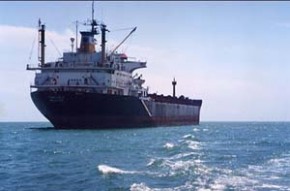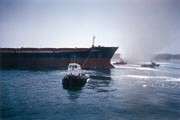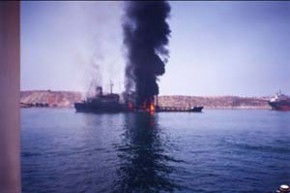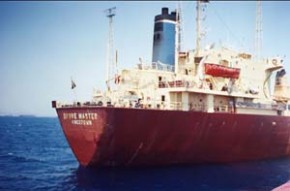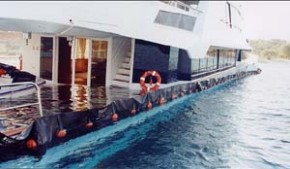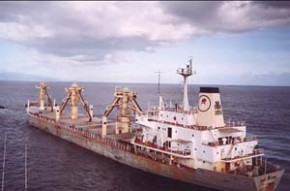Operations List
TSAVLIRIS attended the stranded 54.309 dwt bulker "THETIS I", which grounded at Port Klang pilot station on 26 May. The Group chartered the ITC managed 974 –gt tug "SUMATRAS", which helped to refloat the vessel on 29 May. Class surveyors at the anchorage found no damage. The bulker underwent engine repairs at anchor before continuing to Rotterdam.
On 30 May TSAVLIRIS won an LOF to salve the 33,788 dwt Products Motor Tanker "FAY STAR", which sustained a flooded engine room at Puerto Cabello fully laden with vegetable oil. By June 5, the engine room had been dried out. It was cleaned a day later, a job that included the removal of oily water from the bilges. After some additional repairs the vessel was then towed to Curacao by the chartered tug Seabulk Gannet.
In early June, the TSAVLIRIS owned tug "LEOPARD" was dispatched under a Lloyd's Open Form to assist the 12.000 Motor Vessel "PETER", reportedly taking on water after a scrape with a larger bulk carrier a few miles outside the port of Owendo. However, the vessel sank in 10 m of water and her P& I insurer, Terra Nova indicated it would not put up the guarantee provided in the Scopic Clause. After assessing the salvage operation it was concluded the salvage costs would exceed salved values and TSAVLIRIS terminated the LOF agreement.
The "LEOPARD" then proceeded to Owendo where it was held by the Gabonese authorities as a bargaining ship in their attempt to obtain $3 m bond from the shipowners in order to cover conceivable liabilities from the wreck. TSAVLIRIS' salvage master and divers who had been sent from Greece were also prevented from leaving Owendo. This was not the first time that governments had used salvage tugs as scapegoats for accidents in nearby waters, despite the fact that salvors bore no responsibility. In this instance TSAVLIRIS was not the only victim of the affair as the 25 crewmembers of the Motor Vessel "PETER" were also prevented from leaving Gabon, pending the provision of security by Terra Nova.
Fortunately, the Leopards' plight did not last too long, as diplomatic channels were able to persuade the authorities to release the vessel and the salvage team. However, the crew of the Motor Vessel "PETER" were not that lucky and while the lower ranks were later repatriated, the ships officers were kept in Owendo for several weeks with their passports withheld.
Several vessels were threatened when a slops reception barge became a raging inferno at a busy ships' anchorage off Salamis Island, Greece, on the evening of 15th June. TSAVLIRIS tug "MEGAS ALEXANDROS" aided at risk the bulk carrier "LEADER A II" from a blazing barge, which was towed to a safer anchorage in Piraeus.
Several vessels were threatened when a slops reception barge became a raging inferno at a busy ships' anchorage off Salamis Island, Greece, on the evening of 15th June. As flames hopped to the nearby "RALLIA", her owners called in TSAVLIRIS under a Lloyd's Open Form to control the blaze aboard their 15,700-lonne cargo ship. The 10,000 hp "MEGAS ALEXANDROS" fought the fire in the Rallia's accommodation and engine-room area throughout the night, extinguishing the flames early the following morning.
One of the most impressive leisure craft salvage operations was the Motor Yacht "ONTARIO" which ran aground early August at Seskli island, near Rhodes in the Eastern Aegean. After despatching the "ATLAS" from TSAVLIRIS fleet and engaging a local tug to help to refloat the waterlogged vessel The Group's technicians pumped out all the sea water, patched the damage to her hull and carried out preservation of her machinery.
The vessel was safely redelivered to her owners in Rhodes.
The Bulk Carrier "FLAME" while carrying steel products from the Black Sea to South America, broke down in mid Atlantic. The vessel was towed by TSAVLIRIS' super tug "FOTIY KRYLOV" to Trinidad.
The 7,000 dwt cargo ship "ANDREAS P" loaded with approximately 7,000 tonnes of barley grounded at Preveza Channel, while on a voyage from Immingham to Preveza. The vessel was successfully refloated and safely redelivered to her owners on August 8.
Typifying the Group's adventerous, ready- to-go approach to casualties was this difficult operation to salve the Motor Vessel "ANEMONE" off the South American coast . The 17,180 tonne multipurpose cargoship was abandoned at sea by her crew, with a flooded engine room and water reportedly washing over hae afterdeck. Although TSAVLIRIS hired a local tug and a spotter plane to hunt for the vessel, she was missing for several days and feared lost. But the ship and her steel cargo were eventually located and towed to Trinidad for de-watering, repairs and machinery preservation.
The 14.000 dwt vessel "X-PRESS NILGIRI" laden with 600 containers was immobilised off Colombo, on her passage to Mumbai. Two subcontracted tugs were despatched to assist the casualty and towed her to Mumbai.
The 30.000 dwt cargo ship "ANAX" while on a laden voyage with Zinc concentrates and fish meal from Peru To Thailand, broke down off Solomon Islands.
The vessel was towed to Port Moresby.
